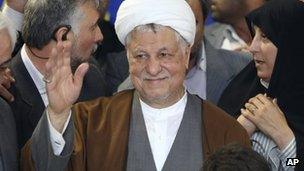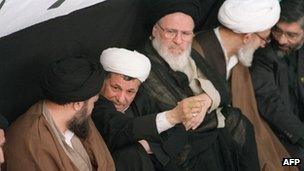Rafsanjani exclusion shows Iran establishment's weakness
- Published

The disqualification effectively sends Akbar Hashemi Rafsanjani into retirement
Iran's senior pragmatist politician, Akbar Hashemi Rafsanjani, will not be allowed to stand in the presidential election on 14 June.
The decision was made by the country's constitutional watchdog, the Guardian Council, which has the authority to ban prospective candidates on the grounds of unsuitability for the post of president.
More than anything, the disqualification of Mr Rafsanjani will have serious consequences for the Islamic Republic itself.
For one thing, it means that the centrist faction led by the 78-year-old has been pushed out of the political establishment.
All those who felt he was representing them in this election will now probably step out of the political process and boycott it.
This includes several important social groups, such as sections of the middle class, the Bazaaris, or commercial class, and the more traditional clergy.
Mr Rafsanjani's disqualification also shows a weaker and agitated political establishment prepared to rip out its own roots.
The Islamic Republic now stands more vulnerable to the elements. It will have to create more brutal defence mechanisms to protect itself from the very social groups it has rejected.
Revolutionary-turned-reformist
Mr Rafsanjani is a founding member of the Islamic Republic, the man who managed and then ended eight years of war with Iraq in the 1980s and led the subsequent reconstruction programme.
But after half a century in revolutionary politics he had become a moderate. For the past four years he has been calling for moderation at home and in foreign policy, as well as a more open and tolerant society.
The conservative faction and the right-wing could not tolerate this change and have been pushing him back, step by step, from his areas of authority. His children were even sent to prison on what many said were trumped-up charges.
Now, as Mr Rafsanjani goes down, his de facto coalition of reformists and centrists could abandon him and effectively send him into retirement.

Mr Rafsanjani is a founding member of the Islamic Republic
With the disqualification, elements from the reformist camp will argue that Mr Rafsanjani's attempt to participate in the election process was a worthwhile venture that mobilised parts of their social base. But this group will probably be in the minority.
Some will criticise him for abandoning the declared objectives of the pro-reform camp - as set by the imprisoned leader Mir Hussein Mousavi - in favour of an ill-judged political venture.
Others will lose faith and abandon politics altogether. At best, they will say that in the long term the rise of an educated middle class will turn the tables. At worst, they will succumb to political isolationism.
Things could also move towards a more radical posture too. Despite seeing the chaos in Syria, Libya and Egypt, some opposition groups will argue that there is no hope short of bringing down the regime in its entirety.
Whatever the upcoming scenarios might be, with Mr Rafsanjani officially outside the political mainstream, the Islamic Republic has turned an important page in its history.